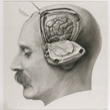Monday, 3 September 2012
The beginning of modern neurosurgery
 Probably the oldest form of neurosurgery is trepanation, which consisted in drilling a hole in the skull to allow evil spirits to escape from the brain. For example, scientists have found the skull of a young girl who was trepanned with a flint instrument in about 3 500 BCE. What is most remarkable are the scars suggesting that she survived this operation.
Probably the oldest form of neurosurgery is trepanation, which consisted in drilling a hole in the skull to allow evil spirits to escape from the brain. For example, scientists have found the skull of a young girl who was trepanned with a flint instrument in about 3 500 BCE. What is most remarkable are the scars suggesting that she survived this operation.
Modern neurosurgery did not really begin until the late 19th century, when surgeons opened the meninges to operate directly on the brain. But these first years were difficult ones: the survival rate for any surgical procedure that involved opening the skull was only 10%!
Then came American surgeon Harvey Cushing (1869-1939), now regarded as the father of modern neurosurgery. In the early 20th century, he developed a great many new techniques that increased the survival rate for neurosurgery spectacularly, to over 90%! (more…)
From the Simple to the Complex | Comments Closed
Monday, 27 August 2012
How Poverty Harms the Brain
 The brain is highly sensitive to the environment in which it develops, especially during childhood. Since the experiments conducted in the 1960s with rats raised in environments rich in sensory and social stimulation, there is no longer any doubt that an enriched environment promotes brain development, whereas an impoverished environment slows it down.
The brain is highly sensitive to the environment in which it develops, especially during childhood. Since the experiments conducted in the 1960s with rats raised in environments rich in sensory and social stimulation, there is no longer any doubt that an enriched environment promotes brain development, whereas an impoverished environment slows it down.
Regarding humans, there have been countless studies showing that low socio-economic status, usually associated with a poor environment, alters functions such as attention, working memory, language, and self-control. Beyond these, there are the overall harmful effects of social inequality on health. In Montreal, Quebec, for example, life expectancies are 10 years lower in poor neighbourhoods than in rich ones. (more…)
How the Mind Develops, Mental Disorders | Comments Closed
Monday, 20 August 2012
Do we synchronize our neurons to synchronize our thoughts?
 Just as the pendulum of a clock oscillates to keep the time, the human brain’s networks of neurons oscillate together to help us encode certain memories. Or at least that is one of the functions attributed to these neuronal oscillations, which have been largely preserved throughout the history of evolution in the animal kingdom. Researchers are taking a growing interest in these oscillations, because if they do let the brain encode information in terms of time, they represent a valuable tool in addition to the mechanisms by which the brain generates its many spatial representations of the body and the world outside it. (more…)
Just as the pendulum of a clock oscillates to keep the time, the human brain’s networks of neurons oscillate together to help us encode certain memories. Or at least that is one of the functions attributed to these neuronal oscillations, which have been largely preserved throughout the history of evolution in the animal kingdom. Researchers are taking a growing interest in these oscillations, because if they do let the brain encode information in terms of time, they represent a valuable tool in addition to the mechanisms by which the brain generates its many spatial representations of the body and the world outside it. (more…)
The Emergence of Consciousness | Comments Closed
Monday, 13 August 2012
Genes to Cognition Online
 There are not too many web sites about the human brain that are structured according to the human organism’s levels of organization, so that readers always keep this fundamental concept in mind. That is understandable, given the all the extra work involved in writing the content for such a site. But a handful of writers have been energetic enough, or foolish enough, to attempt this approach, including yours truly, with The Brain from Top to Bottom.
There are not too many web sites about the human brain that are structured according to the human organism’s levels of organization, so that readers always keep this fundamental concept in mind. That is understandable, given the all the extra work involved in writing the content for such a site. But a handful of writers have been energetic enough, or foolish enough, to attempt this approach, including yours truly, with The Brain from Top to Bottom.
Because web sites like mine are so scarce, I would feel remiss if I did not let my readers know about another one that has been around for a few years now. It is called Genes to Cognition Online (first link below). (more…)
From the Simple to the Complex | Comments Closed
Monday, 6 August 2012
Our Mirror Neurons Prefer the Movements We’ve Already Learned
 Often I use this blog to talk about the latest studies in neuroscience. But this week I want to talk about a study that was conducted a few years back, because it provides a good introduction to the brain cells known as mirror neurons, which are often described as strange entities indeed.
Often I use this blog to talk about the latest studies in neuroscience. But this week I want to talk about a study that was conducted a few years back, because it provides a good introduction to the brain cells known as mirror neurons, which are often described as strange entities indeed.
Mirror neurons were first identified in the motor area of the frontal cortex of monkeys, by Italian neurophysiologist Giacomo Rizzolatti, in the early 1990s. Rizzolatti discovered that these particular neurons became activated not only when monkeys made a hand gesture or a facial expression (as is normal for motor neurons), but also when monkeys watched other monkeys doing so, without making the gesture or expression themselves (hence the name “mirror neurons”). (more…)
Body Movement and the Brain | Comments Closed








